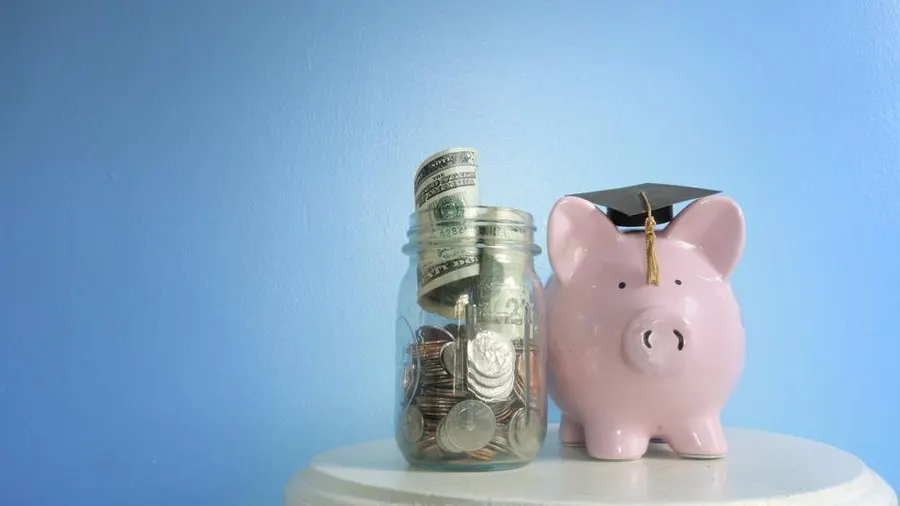Student loan debt can feel overwhelming, but with the right strategies, it’s possible to prepare for and eliminate it. This blog post will help you understand student loans, minimize borrowing, and pay off debt efficiently. Whether you're just starting your education or already in repayment, these steps can guide you toward financial freedom.
Understanding Student Loans & What You Need to Know Before Borrowing
Student loans are a common resource for financing higher education, but they require careful understanding before taking the leap.
Borrowing money for school can impact your finances for many years, so it’s essential to make informed decisions early.
Student loans may seem simple at first glance—money borrowed now, to be paid back later—but the fine print often tells a different story.
Knowing the types of loans available, their terms, and potential risks can empower you to make smarter financial choices and avoid costly mistakes.
Before signing on the dotted line, you need to grasp how loans work, the repayment process, and how interest can dramatically increase your total debt over time.
What Are Federal Loans?
Federal student loans are financial aid options provided by the U.S. Department of Education to assist students in covering the cost of post-secondary education.
These loans generally offer lower interest rates and more flexible repayment terms compared to private loans.
Borrowers are often eligible for income-driven repayment plans that cap payments based on earnings. Federal loans are divided into two primary categories: subsidized and unsubsidized.
Subsidized loans are need-based and do not accrue interest while the student is enrolled at least half-time or during grace periods.
On the other hand, unsubsidized loans start accruing interest immediately upon disbursement.
One of the most significant benefits of federal loans is the potential eligibility for loan forgiveness programs such as Public Service Loan Forgiveness (PSLF).
This means you can erase remaining debt after consistent qualifying payments under certain employment conditions.
What Are Private Loans?
Private student loans are financial products offered by banks, credit unions, and other private lenders.
These loans can be useful when federal aid doesn’t cover the full cost of your education, but they often come with less favorable terms.
Unlike federal loans, private loans require a credit check, and applicants with stronger credit histories or co-signers can qualify for better interest rates.
These loans typically have variable interest rates, meaning your payments could fluctuate over time, potentially increasing your financial burden.
Private loans often lack the borrower protections that federal loans offer, such as income-driven repayment plans, deferment options, and forgiveness programs.
Because of these limitations, students are encouraged to exhaust all federal aid opportunities before considering private loans.
It’s crucial to compare different lenders, rates, and terms before accepting a private loan offer to ensure you’re making the best financial choice.
Why Interest Matters
Interest rates significantly impact the overall cost of your student loans. Federal student loans generally offer fixed rates that remain stable over the life of the loan.
Private student loans often carry variable rates, which can increase, depending on market conditions.
Understanding how interest accrues is vital because it determines how much you’ll repay beyond the original loan amount.
Interest may compound, meaning you pay interest on interest, increasing the debt quickly if unpaid.
If you allow interest to accumulate during school or deferment periods, the total balance owed can balloon.
However, making even small payments toward interest while you’re still enrolled can prevent it from capitalizing.
That small effort can save thousands of dollars over the life of your loan. Knowing exactly how interest works helps you make informed decisions about borrowing and repayment strategies.
Preparing Financially Before You Borrow
Taking time to prepare financially before borrowing student loans can greatly reduce future debt burdens.
Thorough preparation starts with identifying alternative funding sources such as scholarships and grants that don’t need repayment.
Making deliberate choices about which school to attend can also cut costs significantly.
A strong financial plan helps ensure you borrow only what’s necessary and avoid accumulating excessive debt.
The following strategies can help you minimize loan amounts and protect your future financial health.
Apply for Scholarships and Grants
Scholarships and grants are often overlooked but incredibly valuable tools to offset education expenses.
Unlike loans, these awards do not need to be repaid, making them one of the most effective ways to reduce borrowing.
Scholarships are typically awarded based on merit, athletic ability, or unique skills, while grants are often based on financial need.
Spend time researching opportunities through online databases like Fastweb or local organizations in your community.
Completing the Free Application for Federal Student Aid (FAFSA) also opens doors to federal and state grants.
Applying for multiple scholarships might feel tedious, but every dollar earned this way is a dollar you won’t need to borrow and repay later.
Choose a Cost-Effective School
Your choice of college can significantly impact how much student loan debt you take on.
Attending a community college for your first two years can dramatically cut tuition costs while providing the same quality education in general education courses.
Many students choose to transfer to a four-year university afterward to complete their degrees at a fraction of the cost.
Opting for in-state public universities instead of private or out-of-state schools can also lead to substantial savings.
Remember, employers often prioritize your degree and skills over the prestige of the institution you attended.
By being mindful of your educational choices, you can minimize borrowing and enjoy a high return on investment.
Create a Pre-College Budget
Creating a pre-college budget is a crucial step in determining your true financial needs before borrowing.
Begin by listing all expected expenses, including tuition, fees, textbooks, housing, meals, transportation, and personal costs.
Don’t forget to budget for emergencies and miscellaneous expenses that may arise throughout your education.
Knowing exactly what you need can prevent unnecessary borrowing and help you manage funds more effectively once school begins.
Establishing a budget in advance also promotes better spending habits and financial discipline as you transition into college life.
Save Money With a Part-Time Job
Working a part-time job before and during college can provide a steady stream of income to cover daily expenses and reduce reliance on loans.
Whether you find employment on campus or in a nearby business, even a few hours of work each week can add up significantly.
Look for flexible job opportunities that accommodate your academic schedule, such as library aide positions, tutoring, or campus dining services.
Earning your own money also teaches valuable time management and budgeting skills.
The income from part-time work can be applied directly toward tuition, books, or personal needs, decreasing the amount you need to borrow.
Suggested reading: How to Manage Money: The Ultimate Guide to Saving
Smart Borrowing Strategies: Borrow Less, Save More
Taking a strategic approach to borrowing can make your post-college financial life far less stressful.
Instead of borrowing the full amount offered, assess your actual needs and focus on minimizing your loan amounts.
Making smarter choices about your spending and borrowing today will yield major financial benefits in the future.
Practicing restraint and prioritizing your education over lifestyle comforts can help you emerge from college with manageable debt.
Borrow Only What You Need
Borrowing only what you need can save you significant amounts of money in the long run.
It might be tempting to take out the maximum amount offered, but doing so increases your debt and future repayment obligations.
Calculate your essential expenses before accepting any loan funds. Decline any unnecessary loan amounts to avoid overborrowing.
It’s easy to view excess funds as a way to make college life easier, but those funds will eventually have to be repaid with interest.
Live Within Your Means
Frugal living during college can make a big difference in how much student debt you accumulate.
Cutting back on unnecessary expenses like frequent dining out, excessive shopping, or costly entertainment helps keep costs low.
Share housing expenses by living with roommates or explore on-campus housing options that may be more affordable.
Cooking meals at home, using public transportation, and purchasing used textbooks are all excellent ways to save money.
Developing these habits during college not only saves money now but also instills financial discipline that benefits you long after graduation.
Suggested reading: Can You Actually Make Money from Surveys?
Take Advantage of Federal Loans
Whenever possible, prioritize federal student loans over private options. Federal loans typically offer lower interest rates, more flexible repayment terms, and access to forgiveness programs.
Subsidized loans, in particular, do not accrue interest while you’re in school, making them a valuable tool in reducing long-term debt.
Once your subsidized loan limits are reached, consider unsubsidized federal loans before exploring private lenders.
Understanding the benefits of federal loans ensures you maximize available protections and avoid unnecessary risks associated with private borrowing.
Pay Interest While in School
Making interest payments on your loans while still in school can substantially reduce your total repayment amount.
Even small monthly payments toward accrued interest prevent that interest from capitalizing and increasing the overall loan balance.
Many borrowers defer payments until after graduation, but taking proactive steps now leads to major savings later.
Contact your loan servicer to set up interest payments while enrolled and build good repayment habits before they’re required.
Creating a Post-Graduation Loan Repayment Plan
After graduation, repaying student loans becomes a financial priority. Developing a clear and effective plan is essential for staying on top of your debt.
Without a well-thought-out strategy, managing monthly payments can become overwhelming. Start by understanding the details of each loan you have.
Organizing this information helps you prioritize repayment and avoid missed deadlines.
A comprehensive plan also enables you to explore various repayment options and choose the one that best fits your financial situation.
Whether you’re entering the workforce immediately or pursuing additional education, taking control of your loan repayment early can prevent long-term financial stress.
Understand Your Loans
The first step in creating a repayment plan is to fully understand your loans. Gather information on every loan you’ve taken, including the lender’s name, loan balance, interest rate, and repayment terms.
Understanding the difference between federal and private loans is also important, as they often have different rules and benefits.
This information will help you decide which loans to focus on repaying first. In most cases, it makes sense to prioritize loans with the highest interest rates to reduce the overall cost.
Having a clear picture of your debt allows you to make informed decisions and avoid surprises down the road.
Select a Suitable Repayment Plan
Federal student loans offer a variety of repayment plans designed to accommodate different financial situations.
The standard repayment plan is often the most cost-effective because it limits the total interest paid over the life of the loan.
However, if your income is low after graduation, an income-driven repayment plan may be a better fit. These plans cap your monthly payment based on your income and family size.
Graduated repayment plans start with lower payments that increase over time, which may work if you expect your earnings to grow.
Carefully review the terms of each plan before deciding. Choosing the right plan early helps you stay consistent and avoid delinquency.
Automate Your Payments
One of the simplest ways to stay on top of your loan payments is to automate them. Most loan servicers allow you to set up automatic withdrawals directly from your bank account.
This ensures your payments are made on time each month, helping you avoid late fees and potential credit damage.
Many lenders even offer a small interest rate reduction as an incentive for enrolling in autopay.
Automation removes the risk of forgetting a payment and keeps you on track toward eliminating your debt.
Make sure your account has sufficient funds on the scheduled withdrawal date to avoid overdraft fees.
Include Loan Payments in Your Budget
Treat your loan payments as a non-negotiable part of your monthly budget. Prioritize them alongside rent, utilities, groceries, and transportation.
By budgeting for these payments, you’re less likely to fall behind or skip them during tight months.
Creating a detailed budget also allows you to find areas where you can cut back on unnecessary expenses.
Allocate any extra money toward additional loan payments when possible.
The goal is to make your loan payments a regular, manageable part of your financial life so you can continue making progress without feeling burdened.
Explore Forgiveness Options
Certain careers make you eligible for student loan forgiveness programs. If you work in public service, education, or healthcare, you may qualify for forgiveness after a set number of payments.
One popular program is Public Service Loan Forgiveness (PSLF), which forgives the remaining balance of your federal loans after 120 qualifying payments under a qualifying repayment plan.
Other programs exist for teachers and healthcare workers in underserved areas. Understanding these programs and meeting their requirements can save you significant money.
Make sure you follow all guidelines, submit the necessary paperwork, and stay updated on eligibility criteria to avoid any setbacks.
Eliminating Student Loan Debt Faster: Proven Strategies to Pay Off Loans
Eliminating student loan debt ahead of schedule requires discipline, strategy, and effort. The good news is that it’s entirely achievable.
By applying proven tactics, you can shorten your repayment term and save thousands in interest.
Accelerated repayment doesn’t have to involve drastic lifestyle changes. Instead, small, consistent actions can make a substantial difference over time.
Below are some of the best strategies for speeding up your student loan payoff journey and regaining financial freedom sooner.
Make Extra Payments
Making extra payments toward your student loans is one of the most effective ways to pay them off faster.
Extra payments reduce the loan’s principal balance, which in turn lowers the amount of interest you’ll pay over time.
Even small amounts, like an additional $50 a month, can make a big difference over the years.
Some people choose to apply lump sums from bonuses or tax refunds directly to their loans.
When making extra payments, be sure to specify that you want the funds applied to the loan’s principal to maximize your savings.
Refinance Your Loans
Refinancing your student loans can lower your interest rate and potentially reduce your monthly payment.
By refinancing, you replace your existing loans with a new one from a private lender, ideally at a lower rate.
This is especially beneficial if you have high-interest private loans or a strong credit score.
However, refinancing federal loans into private ones means losing federal protections like income-driven repayment plans and loan forgiveness options.
Before refinancing, shop around with multiple lenders to find the best terms. Carefully weigh the pros and cons before making a decision.
Suggested reading: Business Loans: An easy to understand guide
Earn Extra Income With a Side Hustle
A side hustle can help you generate additional income that you can apply toward your student loan payments.
Many people turn hobbies or skills into profitable ventures by freelancing, tutoring, or offering services online.
You can also explore options like dog walking, ride-share driving, or selling handmade crafts.
By dedicating this extra income specifically to loan repayment, you can reduce your loan balance much faster.
Online earning strategies, such as participating in surveys or affiliate marketing, can also provide supplemental income streams.
Explore your talents and interests to find opportunities that work for your schedule.
You can start with simple online earning strategies like taking online surveys.
Suggested reading: earning extra income by taking surveys.
Use Lump Sums Wisely
Windfalls such as bonuses, tax refunds, or cash gifts present an excellent opportunity to make substantial payments on your student loans.
Applying these lump sums directly to your loans reduces the outstanding principal and can significantly shorten your repayment timeline.
Before spending these funds on discretionary purchases, consider how much progress you can make by applying them to your debt.
Prioritizing loan repayment during times of financial surplus accelerates your journey toward freedom from student loans and provides a strong sense of accomplishment.
Adopt the Snowball or Avalanche Method
Two popular strategies for paying off multiple loans are the snowball and avalanche methods.
The snowball method focuses on paying off the smallest loan balances first, creating quick wins that build motivation.
Once a small loan is paid off, you apply that payment amount toward the next smallest balance, gradually building momentum.
The avalanche method, on the other hand, targets loans with the highest interest rates first. This saves more money in interest over time but may take longer to achieve the first payoff milestone.
Choose the method that aligns best with your personality and financial goals to stay committed.
Staying Motivated on Your Student Loan Debt-Free Journey
Repaying student loan debt is a marathon, not a sprint. Staying motivated is critical to maintaining the consistency required to reach your financial goals.
Without ongoing motivation, it’s easy to feel discouraged, especially when progress seems slow.
Creating a support system, celebrating wins, and keeping your long-term vision in mind can help you maintain momentum.
By keeping your eyes on the prize and acknowledging your successes along the way, you can stay encouraged and driven.
Track Your Progress
Regularly tracking your loan repayment progress helps you stay aware of your achievements and motivates you to keep going.
Monitoring balances allows you to see how far you’ve come and how much remains. You can use a spreadsheet, financial software, or loan servicer dashboards to track payments and milestones.
Celebrating each step forward can make the repayment process feel less overwhelming and more rewarding.
Watching your principal balance drop provides tangible proof that your efforts are paying off.
Celebrate Small Wins
Breaking your repayment journey into smaller, more manageable milestones makes it easier to stay motivated.
Celebrate when you reach goals such as paying off one loan entirely, reducing your balance by a certain percentage, or making six months of on-time payments.
These celebrations don’t need to be extravagant—simple rewards like a favorite treat, a night out, or a small purchase can mark the occasion.
Acknowledging your progress helps reinforce positive behaviors and keeps your momentum strong.
Find a Support Community
Joining a support community can offer encouragement and accountability during your loan repayment journey.
Look for online forums, social media groups, or local meetups focused on personal finance and debt repayment.
Sharing your experiences and learning from others can help you discover new strategies, overcome obstacles, and stay inspired.
Surrounding yourself with people who understand your goals creates a sense of camaraderie that makes the process less isolating and more motivating.
Keep Your Future in Mind
Visualizing your life after student loan repayment can strengthen your motivation to stay focused.
Imagine what you’ll do with the extra income once your loans are gone—whether it’s saving for a house, traveling, or investing for retirement.
Keeping your long-term dreams in sight reminds you why the sacrifices you’re making today are worth it.
By focusing on the freedom and opportunities that come with being debt-free, you’ll stay inspired to push through any challenges that arise.
Suggested reading: Financial Planning Tips for New Entrepreneurs
Reward Yourself Responsibly
Setting up rewards for reaching significant repayment milestones helps keep the process enjoyable.
These rewards don’t have to derail your budget or slow your progress. Plan small, meaningful treats that align with your financial goals.
Whether it’s a relaxing day trip, a new book, or an affordable dinner out, rewarding yourself responsibly can make the repayment process more sustainable.
These moments of celebration keep you feeling positive and motivated to continue your debt-free journey.
Final Thoughts: Taking Control of Your Student Loan Debt
Student loan debt may feel overwhelming, but with preparation, smart borrowing, and a solid repayment plan, you can take control.
By making thoughtful choices before borrowing and staying proactive with repayment strategies, you can reduce your financial burden.
The journey may be long, but every extra payment, frugal decision, and motivated action brings you closer to debt freedom.
Start by taking small steps today. Create a budget, explore forgiveness programs, and commit to regular payments.
Over time, these actions will lead to lasting financial stability. Remember, your future is in your hands.
Taking control of your student loan debt now sets you up for a more secure, prosperous life.




